#British Society of Cinematographers
Explore tagged Tumblr posts
Text


""LAWRENCE OF ARABIA TOOK TWO YEARS AND WAS SHOT IN SPAIN, MOROCCO, AND JORDAN."
PIC INFO: Resolution at 1638x2048 -- Spotlight on the many wide shots from "Lawrence of Arabia" (1962), directed by David Lean, photographed by Freddie Young (OBE, BSC, ASC), stills uploaded on November 17, 2023 by "justashott."
"The three films he made with David Lean were a challenge. “Lawrence of Arabia" took two years and was shot in Spain, Morocco and Jordan. The heat in the desert was a dry heat of 110 degrees. We had a sunshade over the camera and a wet cloth on top of the camera, which acted like refrigerator. We never saw rushes, the results were cabled from London. The famous mirage scene was shot using a 500mm lens. This was obtained from Panavision in Hollywood along with the rest of the camera equipment,” said Young."
-- BRITISH CINEMATOGRAPHER magazine, on the "Gentleman Genius" Freddie Young (OBE, BSC, ASC)
Sources: www.instagram.com/justashottt/p/Czx5u7NM9su & https://britishcinematographer.co.uk/freddie-young-obe-bsc-asc.
#Lawrence of Arabia 1962 Movie#1962#Cinema#60s Cinema#British Cinema#Director of Photography#David Lean#Cinematography#Cinema is Photography#Frederick Archibald Young#Wide Shots#British Cinematographer#Photography#Filmmaking#Lawrence of Arabia Film#1960s#Historical Epic#Freddie A. Young#Lawrence of Arabia 1962#British Film#British Films#Freddie Young#Sixties#60s#British Society of Cinematographers
4 notes
·
View notes
Text
69th British Society of Cinematographers (BSC) Nominations
1 note
·
View note
Text
Lights, camera, shit show
I was just cleaning my OL folders (all those Chinese paintings and scrolls do take a horrendous amount of space, heh) and I just stumbled upon something I completely forgot to share and discuss with you. I found this particular article during my solitaire lurking months and I remember being befuddled by it for a long time, then thought I've lost it for good.
I don't remember ever seeing it shared or discussed in here, either and if, by any slim chance, I am wrong, kindly forgive me. That professional website is now closed, but its content is still available to browse:
Anyway, there goes: https://www.studiodaily.com/2018/06/outlander-dp-stephen-mcnutt-asc-csc-saucy-scottish-show/
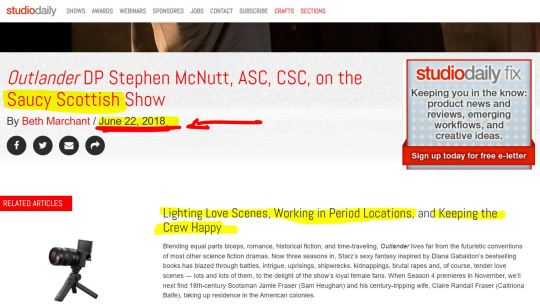
We discussed Terry Dresbach and her inebriated rants, Vanessa Woman's devastating impact on set as Intimacy Coordinator, RDM's jealousy and many other aspects of life on the OL set. Rumors likely to have originated there peppered our shipping trail like flickering lights in a sea of darkness. So yes, we dissected these things to death. But not Stephen McNutt's interview to Studio Daily, on June 22, 2018 - please keep in mind the date, it is essential!
Stephen McNutt is a well-established professional and a member of the American Society of Cinematographers (ASC) and the Canadian Society of Cinematographers (CSC), as he hails from British Columbia. He also has a consistent track record of previous work with RDM, both on Battlestar Galactica and Caprica (its prequel). Therefore, one has to immediately suppose he was handpicked and brought on set by the same RDM, of course: set a very low bar on your expectations, I am warning you.
By the grace of RDM, he was one of the main Directors of Photography for OL during Seasons Two and Three. IMDb is not the best source for corroborating things, because they credit him with 13 episodes in Season Two (including La Dame Blanche- he is the Blue Room guy!), but only one for Season Three (First Wife), which is completely wrong. I even had to check some opening credits on Netflix (at reduced speed, ugh), because he speaks at length of A. Malcolm, something that would have made little sense otherwise. He was there, of course: and his is a first-hand account, heavily loaded with both innuendo and TPTB bullshit, up to the point of complete incoherence.
We focus on the three final questions:
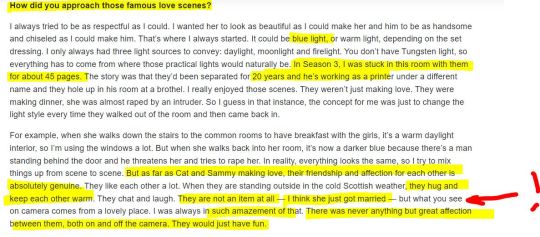
This is a study in bullshitology, right here. The question asked is very clear and very technical: how did you approach those famous love scenes?
The answer is a mumble jumble of retcon, deflections, slips and overall impossible scramble for a logical explanation. I am doing a line by line, because this is almost too good to be true:
'(...) But as far as Cat and Sammy making love (...)' : um, hello and excuse me, I thought the question was about Jamie and Claire?!? And then we are delusional and can't fucking separate, when your own henchman, the Director of Photography no less, seems to be totally unable to do so, too? Hello? Also: 'Sammy'? 'Sammy'? What. The. Total. Fuck, and I LOLed then and I am still LOLing now. Terms of endearment overheard on set - but no, here comes the 'friendship' shite, hitting the narrative fan with Mach 5 speed. Objective? Explaining in a plausible way the hugging and 'keeping warm'. And I am sorry, but this begs the question: what the hell did this man see on that set? And how many people did see the same, hence the need to release such a gratuitous lie, for pure retconning purposes?
'They are not an item at all - I think she just got married'. Oh, fuck my life, man: you are such a terrible, terrible liar! Remember, that interview was taken in June 2018: after the OZ EFH and just about when C. was gleefully answering 'oh, God forbid!' every time she was prompted by press about her marriage plans. How can somebody with a pretty high trophic level and personal rapport to both S and C be totally unaware about C's marital status at the time? How can a long time acquaintance and coworker of RDM say no both to a friend and to a current boss (same person, the worst case scenario) asking for a favor, in that particular context? It also goes to prove that the shit show plot mainlines never originated with S and C and that the Remarkable Week-end was already planned for quite some time. By TPTB. With the full knowledge of RDM.
Let's suppose Mr. McNutt was so deeply engrossed in his work as not to notice all the people who must have congratulated C on set. I mean, I know who our (spinster) colleague from Accounting is currently banging and that guy is (mercifully) not among our staff (I totally wish them well, btw). Maybe because nobody congratulated C on that fakegagement? Also, you know them well enough to confidently say 'they are not an item', but don't know she was not married at the time and state an enormity with the same confidence? What in the name of the hoo-ha did I just read, here?
'I was always in such amazement of that.' In amazement of exactly what, Mr. McNutt? Surely not a woman holding hands or keeping warm with her gay co-star on set, huh? I mean, I need the best American English dictionary, here:
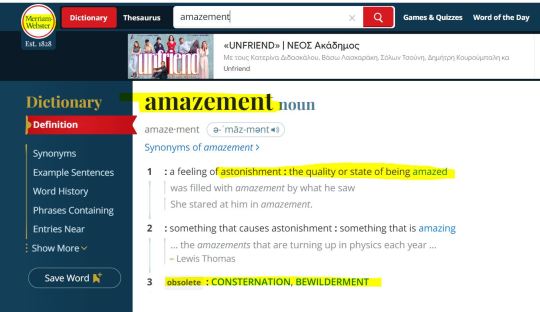
Again: what the heck did this man see? What comments did he hear? Surely, 'amazement' is a very precise choice of wording, with particularly enlightening synonyms:
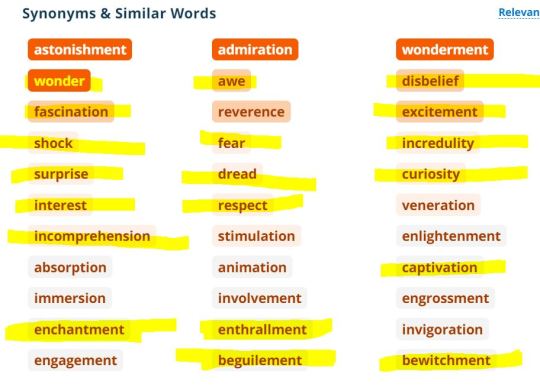
Hence the need to end the demonstration with a deflection: 'They would just have fun.' You know, there is no such thing as a virgin whore, Mr. McNutt: you either are in such astonishment or you think your pals, good old S and C, such a funny girl, were having, well... 'fun', what else? You can't logically have both in the same paragraph!
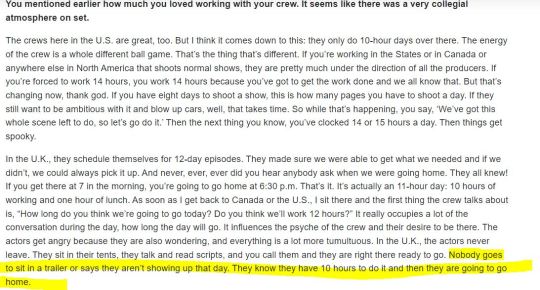
And there we go: 'a very collegial atmosphere on set'. The answer is pure fool's gold, if you ask me: 'Nobody goes to sit in a trailer or says they aren’t showing up that day. '
And I laughed. And I laughed. And I laughed. I really don't know what this man is talking about. I never heard McTavish telling S to get out of that trailer ('nephew'). I never read the 'two very loved-up birdies' in a trailer a-rockin' Anons. I never watched that 2015 Anglophile SDCC interview, when S mentioned listening in their shared trailer to Erasure's Oh, l'Amour and C immediately reacted ('oh, did you just admit to that?'). But unlike me, McNutt must have been legally bound by a big cojones Non-Disclosure Agreement and morally bound by loyalty towards RDM, his friend, boss and benefactor.

This. All of the above. This is the real reason for all the bullshit you've just read: explaining a real, shocking love story by socially progressive regulations, allowing the cast to be 'much more happy'. I would laugh some more, if this was not sinister and cruel, in fact.
It is Love. A deep, strong one. But the seeds of the adverse narrative were planted early and deep, forcing even decent people like this guy to lie and smear himself a bit in the process. What we see and hear now are but better worded and more refined consequences of that fateful January 2016 morning in LA. And since I am allowed the dubious luxury only a healthy distance in time allows, let me remind you a simple, fun fact about this interview who stated they were never an item:
About ten months after McNutt uttered these words, the fandom was hit by the Covfefe Pics.
I rest my case.
152 notes
·
View notes
Text



The Scottish doctor John Macintyre was born on October 2nd 1857.
Macintyre was born in High Street, Glasgow. His father was a tailor. His mother was a cousin of the missionary and explorer David Livingstone, my second post today with a connection to the explorer and missionary.
Macintyre originally trained as an electrical engineer and worked as an apprentice electrician before enrolling to the University of Glasgow in 1878. There he changed his field for medicine and graduated in 1882 with the Bachelor of Medicine degree. He then worked as a naval surgeon in London, Paris and Vienna, and returned to Glasgow to assume a position of a Surgeon for Diseases of the Throat at Anderson's College Dispensary. He later established a private practice specialising in the treatment of singers and actors.
As part of his interest in the larynx he was responsible for creating the first self-illuminated endoscope around 1894/5.
On 5th February 1896,only a year after the invention by German physisist Wilhelm Röntgen, J T Bottomley, Lord Blythswood and John Macintyre gave a presentation to the Philosophical Society of Glasgow on X-rays.
Mcintyre obtained the permission of the managers of Glasgow Royal Infirmary in March 1896 to set up an X-ray department, which was the first in the world. He was actively working on radiography and made the first demonstration of a renal stone, which was verified at surgery.
Macintyre showed the first X-ray cinematograph film ever taken of a frog's knee at the London Royal Society in 1897 and in 1902 published the first paper showing the use of X-rays for therapeutic purposes in an academic journal.
By this time, the number of referrals for X-rays was so large that the Infirmary was approached to build larger premises and the new electrical pavilion was opened in 1902.
Macintyre recognized early on the potential harm of exposure to X-rays and ensured that his staff and he were appropriately protected.
John Macintyre was president of the Röntgen Society -- the forerunner of the British Institute of Radiology -- from 1900 to 1901. He died on 29 October 1928 in his home city of Glasgow.
Pics show the man and the first x-ray department in Glasgow Royal Infirmar
5 notes
·
View notes
Text
NOIR CITY Returns to Oakland's Grand Lake Theatre Today!
Full schedule, tickets and Passports (All-Access Passes) available at NoirCity.com. Eddie Muller in person!
Saturday Matinée • January 20
DOUBLE FEATURE
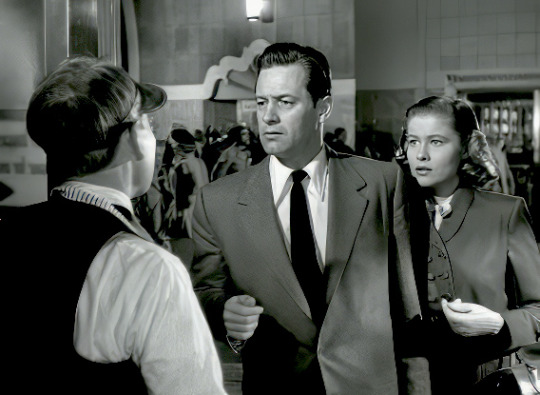
UNION STATION
1:30 PM
Cops William Holden and Barry Fitzgerald race to foil a kidnapping plot in Chicago's Union Station. The film packs a double-feature's worth of thrills into its brief running time, including some brutality decades ahead of its time. Ace crime scenarist Sydney Boehm keeps the plot humming like a runaway train and director (and renowned cinematographer) Rudolph Maté makes the ride more vivid through use of actual locations. Costarring Nancy (Sunset Blvd.) Olson and a terrifying Lyle Bettger.
UNITED STATES (1950) Dir. Rudolph Maté. 80 min.
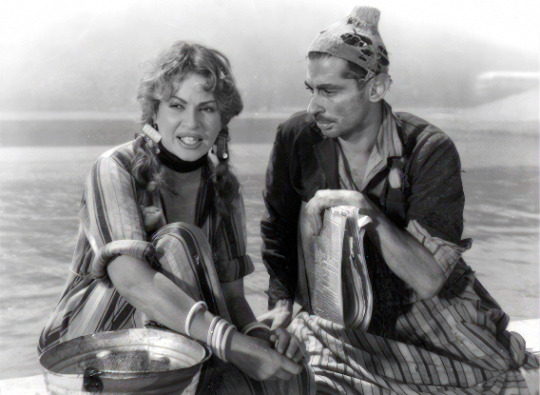
CAIRO STATION/ BAB EL HADID
3:30 PM
A newspaper hawker (played by the director himself) at the eponymous train depot develops a frightening obsession with a sexy lemonade vendor. That's the premise for a suspenseful drama which cunningly uses the bustling station to depict clashing strata of Egyptian society. Chahine's combination of gritty authenticity and psychosexual Expressionism created a landmark of Egyptian cinema—despite public boycotts over its unflinching perversity and politics. Costar Hind Rustum was nicknamed "The Arab Marilyn Monroe." In Arabic with English subtitles
EGYPT (1958) Dir. Youssef Chahine. 77 min.
TICKETS FOR SATURDAY MATINÉE DOUBLE FEATURE
Saturday Evening • January 20
DOUBLE FEATURE

ODD MAN OUT
7:00 PM
This intense manhunt thriller won the inaugural "Best Film" prize from the British Academy of Film Awards, and it remains one of the most highly regarded movies ever made in the United Kingdom. James Mason plays fugitive Irish Nationalist Johnny McQueen, roped into a heist that goes fatally wrong. Can Johnny navigate his way safely through a nocturnal nightmare of danger and deceit? Robert Krasker's cinematography is as good as his legendary work with Reed on The Third Man. An all-time classic!
UNITED KINGDON (1947) Dir. Carol Reed. 116 min.
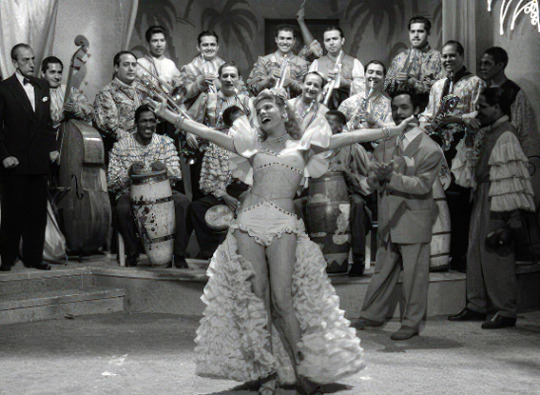
VICTIMS OF SIN / VICTIMAS DEL PECADO
9:30 PM
NEW 4K RESTORATION A film that virtually leaps off the screen. The music, the characters, the confrontations, the emotions—all boil over the top in this uniquely Mexican version of noir dubbed rumberas. Sexy Ninón Sevilla dances up a storm in a club featuring some of Latin America's top performers—Pérez Prado, Rita Montaner and Pedro Vargas—all while dodging a vicious pimp, defying her boss, and rescuing an abandoned baby from the trash. As André Breton is reputed to have said, "In Europe we talk about surrealism, in Mexico they live it every day." In Spanish with English subtitles
MEXICO (1951) Dir. Emilio Fernández. 90 min.
TICKETS FOR saturday evening DOUBLE FEATURE
#film noir foundation#noir alley#noir city#noir city 21#noir city oakland#grand lake theatre#film festival#film noir festival#film restoration#victims of sin#odd man out#cario station#union station
9 notes
·
View notes
Text
Cinematography: Five very different nominees

The nominees are:
The Brutalist
Dune: Part Two
Emelia Pérez
Maria
Nosferatu
The Brutalist is likely not going to have a big night, despite its 10 nominations. One of its best bets, though, is in cinematography. It has the most significant industry award to date — the BAFTA. It also won at the British Society of Cinematographers.
But other awards bodies have been spreading the wealth. The Critics Choice went to Nosferatu. The American Society of Cinematographers selected Maria, though that may just be because there’s a lot of love for Edward Lachman among his peers.
I’m bummed that Emilia Pérez made it into this category over what I think are more deserving nominees like Nickel Boys and Conclave.
Greig Fraser previously won the Cinematography Oscar for his outstanding work on Dune, so I don’t think he’s going to get it again, deserving as he may be.
Who will win: The Brutalist
But look out for: Maria
Who I’d vote for: Dune: Part Two
If I could add one more: Nickel Boys
◄ Previous: Documentary Short | Next: Film Editing ►
INTRODUCTION | FEATURES AND SHORTS: International Feature | Animated Feature | Documentary Feature | Live Action Short | Animated Short | Documentary Short | TRADE CRAFTS: Cinematography | Film Editing | Production Design | Costume Design | Makeup and Hairstyling | Sound | Visual Effects | Original Score | Original Song | TOP CATEGORIES: Original Screenplay | Adapted Screenplay | Supporting Actor | Supporting Actress | Actor | Actress | Director | Picture | TOP 10 FILMS OF 2024
#movies#Oscar picks#Oscars 2025#Cinematography#The Brutalist#Dune: Part Two#Emilia Pérez#Maria#Nosferatu
0 notes
Text
'The Brutalist's Lol Crawley Wins Cinematography Award
The Brutalist has taken home the top prize at the 69th British Society of Cinematographers Awards in London. Lol Crawley won Best Cinematography in a Feature Film Award for his work on the Oscar-nominated film, in his first ever nomination in the category. Jody Lee Lipes won the TV equivalent for his work on the BBC drama The Listeners, making him the first person to win back-to-back awards…
0 notes
Text
0 notes
Text
‘The Brutalist’s’ Lol Crawley Wins British Society of Cinematographers Function Movie Award
“The Brutalist’s” Lol Crawley has gained the British Society of Cinematographers Award for finest cinematography in a characteristic movie award. Jody Lee Lipes gained for his work on the BBC drama “The Listeners.” Lipes took residence the award within the tv drama (UK Terrestrial) class. Within the tv drama (Worldwide/Streaming) class, Benedict Spence gained his […] The post ‘The Brutalist’s’…
0 notes
Text


A LOOK AT THE SWEEPING MAJESTY OF THE WIDE SHOTS OF OLD -- CLASS OF '62.
PIC(S) Mega spotlight on assorted film stills depicting the extensove use of wide shots in 1962's epic biographical adventure drama film "Lawrence of Arabia," directed by David Lean and photographed by Freddie A. Young (1902-1998).
Resolution at 1874x1892 & 1169x1170.
"Young is definitely ‘the master’ in my book of cineastes. Arguably and certainly in his era he was the best cameraman in the world. I had the pleasure of involvements with him and his crew from "Lawrence Of Arabia" onwards. David Lean was such a brilliant storyteller but nobody when working on one of his movies would accuse him of being easygoing. Freddie carried on for him regardless of personal and technical problems. Apart from three American Oscars Freddie won many awards including only the second Fellowship after Hitchcock from our own Academy BAFTA."
-- Sir Sydney Samuelson to BRITISH CINEMATOGRAPHER magazine, on the "Gentleman Genius" Freddie Young (OBE, BSC, ASC)
Sources: https://x.com/CinemaGrids/status/1114405144135782400 (Cinema Grids 2x) & https://britishcinematographer.co.uk/freddie-young-obe-bsc-asc.
#Lawrence of Arabia 1962#Freddie Young#Director of Photography#David Lean#British Cinema#60s Cinema#1962#Cinematography#Cinema is Photography#Sixties#British Films#British Film#British Society of Cinematographers#Frederick Archibald Young#Wide Shots#British Cinematographer#Photography#Filmmaking#Lawrence of Arabia Film#Lawrence of Arabia 1962 Movie#1960s#Historical Epic#Freddie A. Young#60s
3 notes
·
View notes
Text
Robbie Ryan Wins British Society of Cinematographers (BSC) Award for 'Poor Things'

View On WordPress
0 notes
Text
By Rajan Laad
The Poland-based Camerimage Film Festival is unique because it celebrates cinematography in film, television, streaming, and music videos. Alfred Hitchcock famously said, "To make a great film you need three things -- the script, the script, and the script." While the script is the soul of the film, the cinematography is the face of the film. All that is depicted on screen is what the cinematographers or the directors of photography capture on their cameras. It isn't just the breathtaking moments owing to vast landscapes or gargantuan sets that the cinematographer captures. The most sensitive moments on film are the results of the cinematographer capturing every nuance of expression on the countenance of an actor.
Cinematic milestones such as Gone with the Wind (1939), Lawrence of Arabia (1962), The Godfather (1972), Indiana Jones and the Raiders of the Lost Ark (1981), Blade Runner (1982), etc. wouldn't be regarded as masterful without the exquisite cinematography.
The Camerimage festival this year was marred due to 'sexist' opinions of the festival's director Marek Żydowicz in an op-ed for Cinematography World about female directors and cinematographers. Żydowicz received intense backlash from many in the film industry and tried to extinguish the fire with not just one but two apologies but the outraged mob thought his sexism was too severe for forgiveness. The British Society of Cinematographers replied to Żydowicz that they were "disheartened and angered by your profoundly misogynistic comments and aggressive tone, which we view as symptomatic of a deep-rooted prejudice."
Filmmaker Steve McQueen and his cinematographer Yorick Le Saux for the film Blitz pulled out of the festival in protest. McQueen was to receive a special award. Director Coralie Fargeat and cinematographer Benjamin Kračun of the film The Substance withdrew their film from the competition and didn't attend the festival. The festival jury didn't withdraw but "committed to being part of any gender representation debate."
1 note
·
View note
Text


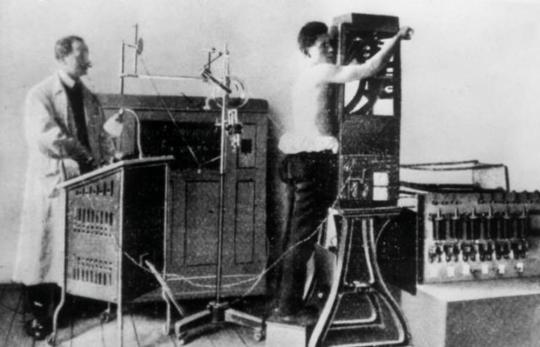
The Scottish doctor John Macintyre was born on October 2nd 1857.
Macintyre was born in High Street, Glasgow. His father was a tailor. His mother was a cousin of the missionary and explorer David Livingstone, my second post today with a connection to the explorer and missionary.
Macintyre originally trained as an electrical engineer and worked as an apprentice electrician before enrolling to the University of Glasgow in 1878. There he changed his field for medicine and graduated in 1882 with the Bachelor of Medicine degree. He then worked as a naval surgeon in London, Paris and Vienna, and returned to Glasgow to assume a position of a Surgeon for Diseases of the Throat at Anderson's College Dispensary. He later established a private practice specialising in the treatment of singers and actors.
As part of his interest in the larynx he was responsible for creating the first self-illuminated endoscope around 1894/5.
On 5th February 1896,only a year after the invention by German physisist Wilhelm Röntgen, J T Bottomley, Lord Blythswood and John Macintyre gave a presentation to the Philosophical Society of Glasgow on X-rays.
Mcintyre obtained the permission of the managers of Glasgow Royal Infirmary in March 1896 to set up an X-ray department, which was the first in the world. He was actively working on radiography and made the first demonstration of a renal stone, which was verified at surgery.
Macintyre showed the first X-ray cinematograph film ever taken of a frog's knee at the London Royal Society in 1897 and in 1902 published the first paper showing the use of X-rays for therapeutic purposes in an academic journal.
By this time, the number of referrals for X-rays was so large that the Infirmary was approached to build larger premises and the new electrical pavilion was opened in 1902.
Macintyre recognized early on the potential harm of exposure to X-rays and ensured that his staff and he were appropriately protected.
John Macintyre was president of the Röntgen Society -- the forerunner of the British Institute of Radiology -- from 1900 to 1901. He died on 29 October 1928 in his home city of Glasgow.
8 notes
·
View notes
Text

Harrington’s Buildings (central and eastern sections) and adjacent two storey building, Collins Street, north-side, between Swanston and Elizabeth Streets, Melbourne.
Demolished 1938 for Hotel Australia, in turn demolished in 1990s for Australia On Collins.
This significant portion of Harrington’s Buildings, close to Block Arcade in the centre of Collins Street (Melbourne’s most fashionable street), offered much to the gift purchaser.
Kodak cameras, photographic equipment and photographic supplies were available from a shop operated by Harrington’s Ltd, photographic and cinematographic importers.
Harrington’s Ltd (trading as Harrington Cameras) were a household name throughout Australasia, primarily as agents for British and Continental photographic manufacturers and for their printing, enlarging and framing services. From Harrington’s you could buy Ensigns or Brownies in either ‘Box’ or ‘Folding’ forms. Each camera was guaranteed to take good pictures and free instruction was given to all camera purchasers. Wireless sets were available from £2 to £200.
By taking a staircase to the left of the entrance to Harrington’s you could ascend to the showroom of ‘Georgette’, who would dress you – modes and robes, but particularly millinery.
To the immediate east of Harrington’s: stationary, library supplies and books could be bought from Melville and Mullen booksellers. Irish born bookseller Samuel Mullen (1828-1890) arrived in Melbourne in 1859 and opened a bookshop and library at 55 Collins Street East before later moving to these larger premises at 262-264 Collins Street (31 Collins Street East). One of its special features was a circulating library. Based on Mudie’s of London, Mullen’s library was the first of its kind in Australia that specifically catered for the intellectual elite with serious works and high quality fiction.
In the 1870s, for example, Mullen had warned his staff that a Gentleman ‘appears to be buying more books than he can afford’. That Gentleman was Alfred Deakin (a leader of the movement for Australian federation, later the second Prime Minister of Australia and a foundation member of the Historical Society of Victoria, the forerunner of the RHSV). Deakin always paid. By 1925 Melville and Mullen was not in this location – replaced by the Georgian Café. Financial difficulties forced the fusion of George Robertson & Co. with Mullen’s successors, Melville, Mullen and Slade, as Robertson & Mullens (which in 1960 became Angus and Robertson). Perhaps this is evidenced with the ‘removal sign’, or maybe that is but an advertising ploy to attract customers to a ‘bargain’.
If you decided on a presentation portrait as your gift: you could take the stairs to the floor above where T. Humphrey and Co, artists and photographers would arrange an appointment for a ‘sitting’. Above them, second floor front, Fred de Valle, dentist, promised ‘painless’ treatment, maybe in preparation for a considerable festive dinner.
Your shopping spree could also include shoes and boots from A W Eckersall’s ladies bootery on the ground floor of 260 Collins Street (just next door). Or, exhausted, you could seek refreshment upstairs at the Astor Tea and Luncheon Rooms (Mrs G Helen, proprietor). Alternatively, for tea or lunch you may have walked west to the Café Australia (A. Lucas, proprietor, previously the Vienna Café, immediately next door to Harrington’s Cameras.
Reputedly built in 1879 to the plans of pre-eminent architect Lloyd Tayler (National Bank of Australasia, Australian Club), Harrington’s Buildings was an example of ‘restrained classicism and mannerist details’. It was demolished in 1938 for the erection of the Hotel Australia. In turn, this was demolished in the early 1990s and replaced by Australia on Collins (now under renovation).
0 notes
Text
nowe filmy pełne
Sprawdź repertuar Kin - Przysięga Ireny!
Repertuar kin : w repertuarze kinowym film „Przysięga Ireny” zasługuje na szczególną uwagę. To historia młodej dziewczyny, która zmuszona została do bycia kochanką starego niemieckiego oficera, aby uratować życie swoich przyjaciół.
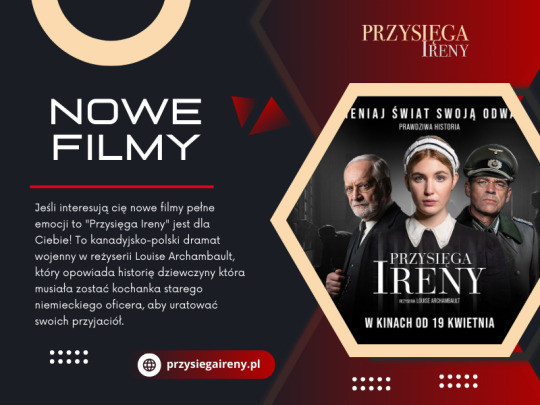
Twórcy filmu
Dan Gordon, uznany kanadyjski scenarzysta, jego kariera nabrała rozpędu dzięki kultowemu serialowi telewizyjnemu „Highway to Heaven”. Do jego najbardziej znaczących prac należą scenariusze do filmów akcji, dramatów i biografii. „Pasażer 57” z Wesleyem Snipesem w roli głównej, to emocjonujący thriller akcji, który zyskał uznanie zarówno widzów jak i krytyków. Film pt. „Wyatt Earp” z Kevinem Costnerem to z kolei epicka opowieść o jednej z ikonicznych postaci Dzikiego Zachodu. Kolejne jego scenariusze to m.in. „Murder in the First”, z udziałem Christiana Slatera i Kevina Bacona oraz „Let There Be Light” z Kevinem Sorbo.

Jednym z najbardziej wyróżniających się osiągnięć Gordona jest scenariusz do filmu „The Hurricane”, w którym Denzel Washington wcielił się w postać Rubina Hurricane’a Cartera, boksera niesłusznie skazanego za morderstwo. Ten poruszający dramat biograficzny, nominowany do Oscara, zyskał uznanie za szczegółowe przedstawienie błędów systemu sądowniczego i niezłomną walkę o sprawiedliwość.Gordon wykazał również swoją zdolność do tworzenia intrygujących opowieści szpiegowskich i thrillerów, czego dowodem jest scenariusz do filmu „The Assignment”, z Donaldem Sutherlandem i Benem Kingsleyem w rolach głównych.
Od Thrillerów, poprzez filmy akcji aż po filmy biograficzne
Przysięga Ireny to film adresowany do szerokiej publiczności.
Dla miłośników filmów akcji Dana Gordona , to na półce nowe filmy Dana Gordona na szczególną uwagę zasługuje „Przysięga Ireny” , film o młodej Polce dla której bycie kochanką starego Niemca było gorsze od gwałtu.
Reżyseria
Louise Archambault, kanadyjska scenarzystka i reżyserka, zyskała międzynarodowe uznanie dzięki swojemu debiutanckiemu filmowi krótkometrażowemu „Atomic Saké”, który przyniósł jej prestiżowe nagrody, w tym Jutra za najlepszy film krótkometrażowy. Jej pierwszy pełnometrażowy projekt, „Familia”, również został ciepło przyjęty na arenie międzynarodowej, zdobywając szereg nagród, w tym nagrodę za najlepszy kanadyjski film pełnometrażowy na Toronto International Film Festival (TIFF) oraz nagrodę Genie za debiut. Archambault ma na swoim koncie również telewizyjne seriale „La Galère”, „Nouvelle Adresse” czy „This Life” dla CBC.
Jej drugi pełnometrażowy film pt. „Gabrielle”, został ciepło przyjęty na Międzynarodowym Festiwalu Filmowym w Locarno, gdzie zdobył Nagrodę Publiczności. Film ten reprezentował Kanadę na Oscarach i Złotych Globach w 2014 roku, zdobywając jednocześnie liczne międzynarodowe wyróżnienia i został sprzedany do ponad 24 krajów.
Archambault została uhonorowana tytułem Osobowości Roku w dziedzinie sztuki i rozrywki przez La Presse/Ici Radio-Canada. Od 2016 roku reżyserowała trzy sezony serialu „TROP” i dwa sezony „Catastrophe” dla Radio-Canada, gdzie ten drugi został wyróżniony nagrodą za najlepszy scenariusz w Cannes w 2018 roku.
W 2019 roku Louise Archambault wyreżyserowała dwa pełnometrażowe filmy: „Il pleuvait des oiseaux” (Deszcz ptaków), który zadebiutował na TIFF i zdobył wiele nagród, w tym za najlepszy międzynarodowy film na festiwalu w Goeteborgu oraz „Merci pour tout” (Dzięki za wszystko), który miał premierę w 2019 roku. Oba filmy osiągnęły wysokie wyniki box office w Kanadzie, zajmując odpowiednio drugie i trzecie miejsce.
W 2023 wyreżyserowała kolejne filmy fabularne francuskojęzyczny „Le temps d’un été” i swój debiut anglojęzyczny „ Przysięga Ireny” .
Obraz w filmie Przysięga Ireny
Paul Sarossy jest wielokrotnie nagradzanym autorem zdjęć filmowych, który współpracował z wybitnymi reżyserami. Jest członkiem Canadian Society of Cinematographers (C.S.C.), American Society of Cinematographers (A.S.C.) oraz British Society of Cinematographers (B.S.C.).
Wielokrotnie nagradzany autor zdjęć filmowych Paul Sarossy ma na swoim koncie zdjęcia do takich filmów jak „Guest Of Honour”w reżyserii Atoma Egoyana z Davidem Thewlisem w roli głównej, który miał swoją światową premierę podczas 76. edycji Międzynarodowego Festiwalu Filmowego w Wenecji, oraz „The Padre” w reżyserii Jonathana Sobela z Timem Rothem i Nickiem Nolte w rolach głównych.
W swoim dorobku ma także filmy fabularne „Don’t Talk To Irene” w reżyserii Pata Millsa, „Goon: The Last Of The Enforcers” w reżyserii Jaya Baruchela oraz brytyjski serial telewizyjny „Tin Star” z Timem Rothem w roli głównej. Oprócz ” Guest of Honour”, Sarossy współpracował z reżyserem Atomem Egoyanem przy filmach „Remember” z Christopherem Plummerem i Martinem Landau w rolach głównych, “The Captive”, “Devil’s Knot”, “Chloe”, “Adoration”, “Where The Truth Lies”, “Ararat”, “Felicia’s Journey”, “The Sweet Hereafter”, “Exotica”, “The Adjuster”, a także przy telewizyjnej produkcji ” Krapp’s Last Tape”.
W 2016r. podczas Festiwalu Camerimage : Egoyan i Sarossy zostali uhonorowani Nagrodą dla Duetu za swoją 27-letnią współpracę. Wśród innych filmów Sarossy’ego znajdują się „The Borgias” Neila Jordana z Jeremym Ironsem w roli głównej, „The Duel” Dovera Koshashviliego, „Act Of Dishonour” Nelofera Paziry, „Ripley Under Ground” z Willemem Dafoe w roli głównej, „Head In The Clouds” z Charlize Theron i Penelope Cruz oraz „Charlie Bartlett” z Robertem Downeyem Jr. w roli głównej. Był także autorem zdjęć do filmów Neila Labute’a „Wicker Man” z Nicolasem Cage’em i Ellen Burstyn, „Duety” z Gwenyth Paltrow, nominowanego do Oscara® „Affliction” Paula Schradera z Nickiem Nolte i Jamesem Coburnem, „Picture Perfect” z Jennifer Aniston, „Love And Human Remains” Denysa Arcanda, „The Secret” Vincenta Pereza oraz „The Deal” z Meg Ryan i Williamem H. Macy. Nagrodzony został za zdjęcia za film „Remember” (2016), otrzymał pięć nagród Genies, dwie Gemini, osiem nagród CSC, nominację do nagrody Emmy®, nominację do nagrody ASC, nominację do nagrody BSC oraz nominację do nagrody Independent Spirit. Paul Sarossy wyreżyserował brytyjski film fabularny “Mr. In Between”, który miał swoją premierę na TIFF i zebrał kilka nagród i nominacji, w tym nominację do Grand Prix i nagrodę dla najlepszego aktora na Międzynarodowym Festiwalu Filmowym w Tokyo.
Sześć filmów Sarossy’ego było nominowanych do Złotej Palmy w Cannes.
Tworzenie nastroju w filmie poprzez muzykę
Alexandra Stréliski, zdobywczyni prestiżowej nagrody Juno, to kompozytorka i pianistka neoklasyczna, która mieszka w Quebecu w Kanadzie. Jej album „Inscape” otrzymał certyfikat platynowy w Kanadzie, a także cieszył się popularnością na klasycznych listach przebojów, osiągając pierwsze miejsce w Kanadzie, drugie w Wielkiej Brytanii oraz piąte w USA. Twórczość Stréliski można usłyszeć w wielu serialach i filmach fabularnych, takich jak „Sharp Objects” (Ostre przedmioty), „Big Little Lies” (Wielkie Kłamstewka), „Dallas Buyers Club” (Witaj w klubie) oraz „Demolition” (Destrukcja). Jej utwory były również prezentowane podczas ceremonii rozdania Oscarów w 2014 roku.
Alexandra może pochwalić się imponującą liczbą 300 milionów streamów, 6 milionami wyświetleń na YouTube, 12 milionami słuchaczy miesięcznie na Spotify oraz 140 000 sprzedanymi albumami.
Magazyn Billboard uznał ją za jedną z najważniejszych nowych postaci współczesnej muzyki klasycznej. Urodzona w Montrealu, w prowincji Quebec, Stréliski jest z pochodzenia polską Żydówką.
Za wszystkim stoi producent filmowy
Beata Pisula producentka filmową i telewizyjna, prowadzi butikową firmę producencką K&K Film Selekt. Zadebiutowała filmem który powstał w koprodukcji amerykańsko-polskiej pt. „Dzieci Ireny Sendlerowej” w reż. John Kent Harrison, film ten nie tylko zdobył nagrodę Primetime Emmy, ale również otrzymał nominacje do tak prestiżowych nagród jak Złote Globy i Satelity. Jej kolejny film to „Amok” w reż. Kasi Admik, który otrzymał wyróżnienia i nominacje na renomowanych festiwalach, w tym na Festiwalu Polskich Filmów Fabularnych w Gdyni i Camerimage. W 2023 roku Beata wyprodukowała dwa polskie filmy fabularne zatytułowane: „W nich cała nadzieja” w reż. Piotra Biedronia i film „ O psie, który jeździł koleją” w reż. Magdaleny Nieć dla Canal+. Zrealizowała również koprodukcję kanadyjsko-polską pt. „Przysięga Ireny” w reżyserii Louise Archambault oraz odpowiadała za produkcję w Polsce filmu „WIL” w reżyserii Tima Mielantsa, który obecnie jest dostępny na platformie Netflix.
Nicholas Tabarrok – producent filmowy i telewizyjny, jest założycielem Darius Films Inc., dynamicznej firmy produkcyjnej z siedzibami w Los Angeles i Toronto. Firma Darius Films Inc. wyprodukowała ponad 40 filmów fabularnych, które nie tylko zyskały uznanie na najbardziej prestiżowych festiwalach filmowych na świecie, ale także osiągnęły znaczący sukces komercyjny. Nicholas współpracował z plejadą gwiazd międzynarodowego kina, w tym Ethanem Hawke, Woodym Harrelsonem, Kurtem Russelem, Nicholasem Cage’em, Dennisem Quaidem, Ronem Perlmanem, Snoop Doggiem, Mattem Dillonem, Harveyem Keitelem, Noomi Rapace, Nickiem Nolte, Susan Sarandon, Timem Rothem, Samem Bee, Sandrą Oh i wieloma innymi. Wśród najważniejszych jego produkcji znajdują się takie tytuły jak „Stockholm”, „Art of The Steal”, „The Padre”, „Weirdsville”, „Defendor” i „The Calling”, które zdobyły uznanie zarówno krytyków, jak i publiczności.
Nicholas jest cenionym członkiem licznych prestiżowych organizacji branżowych, w tym Amerykańskiej Gildii Producentów, Akademii Sztuki i Wiedzy Telewizyjnej, Brytyjskiej Akademii Sztuk Filmowych i Telewizyjnych, Kanadyjskiej Akademii Kina i Telewizji oraz Atelier du Cinema European.
Podsumowując
„Przysięga Ireny” to znakomity film, który powstał w koprodukcji kanadyjsko - polskiej , repertuar kin film na ekrany kin w Polsce i Kanadzie wchodzi od 19 kwietnia, a w USA od 15 kwietnia.
0 notes
Photo

(via Previsioni Oscar 2024: Miglior fotografia)
L’American Society of Cinematographers Award assegnato dal sindacato americano dei direttori della fotografia (ASC) ha incoronato Hoyte Von Hoytema per Oppenheimer il favorito di quest’anno per la categoria Miglior fotografia dopo aver vinto numerosi riconoscimenti (39) tra cui il BAFTA che negli ultimi anni è diventato il riconoscimento chiave per la Miglior fotografia. Tra gli altri candidati l’unico che potrebbe a sorpresa rovesciare questo atteso risultato è Povere Creature! che ha vinto il British Society of Cinematographers Award, il corrispettivo britannico dell”American Society of Cinematographers Award, che lo scorso anno fu assegnato proprio al film che vinse l’Oscar per questa categoria: All Quiet On the Western Front.
Ecco un focus sulle previsioni finali tra esclusioni, statistiche e favoriti per la vittoria agli Oscar 2024 nella categoria #BestCinematography
#AwardsSeason #AwardsRace #OscarsRace #RoadtotheOscar #Movies #OscarPredictions #Oscars2024 #StagionedeiPremi #PrevisioniOscar
0 notes